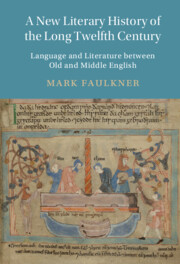 A New Literary History of the Long Twelfth Century
A New Literary History of the Long Twelfth Century Book contents
- A New Literary History of the Long Twelfth Century
- Cambridge Studies in Medieval Literature
- A New Literary History of the Long Twelfth Century
- Copyright page
- Dedication
- Contents
- Figures
- Acknowledgements
- Conventions Used
- Abbreviations
- Part I Preliminaries
- Part II The Affordances of English
- Chapter 3 English in the Linguistic Ecology of the Long Twelfth Century
- Chapter 4 English as a Language of Documentary Record
- Chapter 5 English as a Language for Writing History
- Chapter 6 English as a Language for Sermon Writing
- Chapter 7 Conclusion
- Bibliography
- Index
- Cambridge Studies in Medieval Literature
Chapter 5 - English as a Language for Writing History
from Part II - The Affordances of English
Published online by Cambridge University Press: 14 July 2022
- A New Literary History of the Long Twelfth Century
- Cambridge Studies in Medieval Literature
- A New Literary History of the Long Twelfth Century
- Copyright page
- Dedication
- Contents
- Figures
- Acknowledgements
- Conventions Used
- Abbreviations
- Part I Preliminaries
- Part II The Affordances of English
- Chapter 3 English in the Linguistic Ecology of the Long Twelfth Century
- Chapter 4 English as a Language of Documentary Record
- Chapter 5 English as a Language for Writing History
- Chapter 6 English as a Language for Sermon Writing
- Chapter 7 Conclusion
- Bibliography
- Index
- Cambridge Studies in Medieval Literature
Summary
This chapter considers the maintenance of the Anglo-Saxon Chronicle at Christ Church Canterbury in the first decade of the twelfth century, as well as the acquisition, adaptation, expansion and recopying of earlier manuscripts of the Chronicle contemporary with it. It argues those involved were of both English and foreign descent and worked with a knowledge of the template for vernacular annalistic writing laid down in King Alfred’s reign and developed over the succeeding 150 years. However, in their overt monastic chauvinism, length, use of first person pronouns and direct speech and disregard for chronological organisation, their additions, especially of documents, also anticipated developments in twelfth-century historiography. The Chronicle tradition in effect came to an end at Christ Church by the 1120s, elsewhere by the 1130s, a consequence of changes in the twelfth-century linguistic ecology, the success of Latin translations and, arguably, the innovations introduced by its early twelfth-century adapters.
Keywords
- Type
- Chapter
- Information
- A New Literary History of the Long Twelfth CenturyLanguage and Literature between Old and Middle English, pp. 149 - 183Publisher: Cambridge University PressPrint publication year: 2022
